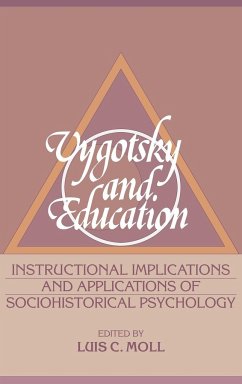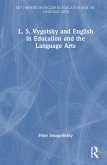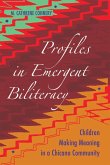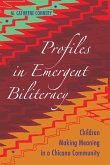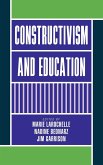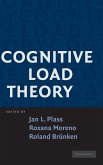Vygotsky and Education
Herausgeber: Moll, Luis C.
Vygotsky and Education
Herausgeber: Moll, Luis C.
- Gebundenes Buch
- Merkliste
- Auf die Merkliste
- Bewerten Bewerten
- Teilen
- Produkt teilen
- Produkterinnerung
- Produkterinnerung
This volume is devoted to analyzing Vygotsky's ideas as a means of bringing to light the relevance of his concepts to education.
Andere Kunden interessierten sich auch für
![L. S. Vygotsky and English in Education and the Language Arts L. S. Vygotsky and English in Education and the Language Arts]() Peter SmagorinskyL. S. Vygotsky and English in Education and the Language Arts186,99 €
Peter SmagorinskyL. S. Vygotsky and English in Education and the Language Arts186,99 €![The Vygotsky Anthology The Vygotsky Anthology]() The Vygotsky Anthology185,99 €
The Vygotsky Anthology185,99 €![Profiles in Emergent Biliteracy Profiles in Emergent Biliteracy]() M. Cathrene ConneryProfiles in Emergent Biliteracy147,80 €
M. Cathrene ConneryProfiles in Emergent Biliteracy147,80 €![Profiles in Emergent Biliteracy Profiles in Emergent Biliteracy]() M. Cathrene ConneryProfiles in Emergent Biliteracy39,15 €
M. Cathrene ConneryProfiles in Emergent Biliteracy39,15 €![Constructivism and Education Constructivism and Education]() Constructivism and Education104,99 €
Constructivism and Education104,99 €![Towards Discursive Education Towards Discursive Education]() Christina. E ErnelingTowards Discursive Education63,99 €
Christina. E ErnelingTowards Discursive Education63,99 €![Cognitive Load Theory Cognitive Load Theory]() Cognitive Load Theory104,99 €
Cognitive Load Theory104,99 €-
-
-
This volume is devoted to analyzing Vygotsky's ideas as a means of bringing to light the relevance of his concepts to education.
Hinweis: Dieser Artikel kann nur an eine deutsche Lieferadresse ausgeliefert werden.
Hinweis: Dieser Artikel kann nur an eine deutsche Lieferadresse ausgeliefert werden.
Produktdetails
- Produktdetails
- Verlag: Cambridge University Press
- Seitenzahl: 452
- Erscheinungstermin: 10. März 2009
- Englisch
- Abmessung: 235mm x 157mm x 31mm
- Gewicht: 880g
- ISBN-13: 9780521360517
- ISBN-10: 052136051X
- Artikelnr.: 26250222
- Herstellerkennzeichnung
- Libri GmbH
- Europaallee 1
- 36244 Bad Hersfeld
- gpsr@libri.de
- Verlag: Cambridge University Press
- Seitenzahl: 452
- Erscheinungstermin: 10. März 2009
- Englisch
- Abmessung: 235mm x 157mm x 31mm
- Gewicht: 880g
- ISBN-13: 9780521360517
- ISBN-10: 052136051X
- Artikelnr.: 26250222
- Herstellerkennzeichnung
- Libri GmbH
- Europaallee 1
- 36244 Bad Hersfeld
- gpsr@libri.de
Preface; Acknowledgments; Introduction Luis C. Moll; Part I. Historical and
Theoretical Issues: 1. Vygotsky: the man and his cause Guillermo Blanck; 2.
The historical context of Vygotsky's work: a sociohistorical approach
Alberto Rosa and Ignacio Montero; 3. Congitive development and formal
schooling: the evidence from cross-cultural research Michael Cole; 4. The
voice of rationality in a sociocultural approach to mind James V. Wertsch;
5. The social origins of self-regulation Rafael M. Diaz, Cynthia J. Neal
and Marina Amaya-Williams; 6. Vygotsky, the zone of proximal development,
and peer collaboration: implications for classroom practice Jonathan Tudge;
Part II. Educational Implications: 7. Teaching mind in society: teaching,
schooling, and literate discourse Ronald Gallimore and Roland Tharp; 8. A
ygotskian interpretation of Reading recovery Marie M. Clay and Courtney B.
Cazden; 9. Vygotsky in a whole-language perspective Yetta M. Goodman and
Kenneth S. Goodman; 10. The development of scientific concepts and
discourse Carolyn P. Panofsky, Vera John-Steiner and Peggy J. Blackwell;
Part III. Instructional Applications: 11. Changes in a teacher's views of
interactive comprehension instruction Kathryn H. Au; 12. Learning to read
and write in an inner-city setting: a longitudinal study of community
change Gillian Dowley McNamee; 13. Writing as a cosial process Joan B.
McLane; 14. Creating zones of possibilities: combining social contexts for
instruction Luis C. Moll and James B. Greenberg; 15. The zone of proximal
development as basis for instruction Mariane Hedgegaard; 16. Detecting and
defining science problems: a study of video-mediated lessons Laura M. W.
Martin; 17. Assisted performance in writing instruction with
learning-disabled students Robert Rueda; Name index; Subject index.
Theoretical Issues: 1. Vygotsky: the man and his cause Guillermo Blanck; 2.
The historical context of Vygotsky's work: a sociohistorical approach
Alberto Rosa and Ignacio Montero; 3. Congitive development and formal
schooling: the evidence from cross-cultural research Michael Cole; 4. The
voice of rationality in a sociocultural approach to mind James V. Wertsch;
5. The social origins of self-regulation Rafael M. Diaz, Cynthia J. Neal
and Marina Amaya-Williams; 6. Vygotsky, the zone of proximal development,
and peer collaboration: implications for classroom practice Jonathan Tudge;
Part II. Educational Implications: 7. Teaching mind in society: teaching,
schooling, and literate discourse Ronald Gallimore and Roland Tharp; 8. A
ygotskian interpretation of Reading recovery Marie M. Clay and Courtney B.
Cazden; 9. Vygotsky in a whole-language perspective Yetta M. Goodman and
Kenneth S. Goodman; 10. The development of scientific concepts and
discourse Carolyn P. Panofsky, Vera John-Steiner and Peggy J. Blackwell;
Part III. Instructional Applications: 11. Changes in a teacher's views of
interactive comprehension instruction Kathryn H. Au; 12. Learning to read
and write in an inner-city setting: a longitudinal study of community
change Gillian Dowley McNamee; 13. Writing as a cosial process Joan B.
McLane; 14. Creating zones of possibilities: combining social contexts for
instruction Luis C. Moll and James B. Greenberg; 15. The zone of proximal
development as basis for instruction Mariane Hedgegaard; 16. Detecting and
defining science problems: a study of video-mediated lessons Laura M. W.
Martin; 17. Assisted performance in writing instruction with
learning-disabled students Robert Rueda; Name index; Subject index.
Preface; Acknowledgments; Introduction Luis C. Moll; Part I. Historical and
Theoretical Issues: 1. Vygotsky: the man and his cause Guillermo Blanck; 2.
The historical context of Vygotsky's work: a sociohistorical approach
Alberto Rosa and Ignacio Montero; 3. Congitive development and formal
schooling: the evidence from cross-cultural research Michael Cole; 4. The
voice of rationality in a sociocultural approach to mind James V. Wertsch;
5. The social origins of self-regulation Rafael M. Diaz, Cynthia J. Neal
and Marina Amaya-Williams; 6. Vygotsky, the zone of proximal development,
and peer collaboration: implications for classroom practice Jonathan Tudge;
Part II. Educational Implications: 7. Teaching mind in society: teaching,
schooling, and literate discourse Ronald Gallimore and Roland Tharp; 8. A
ygotskian interpretation of Reading recovery Marie M. Clay and Courtney B.
Cazden; 9. Vygotsky in a whole-language perspective Yetta M. Goodman and
Kenneth S. Goodman; 10. The development of scientific concepts and
discourse Carolyn P. Panofsky, Vera John-Steiner and Peggy J. Blackwell;
Part III. Instructional Applications: 11. Changes in a teacher's views of
interactive comprehension instruction Kathryn H. Au; 12. Learning to read
and write in an inner-city setting: a longitudinal study of community
change Gillian Dowley McNamee; 13. Writing as a cosial process Joan B.
McLane; 14. Creating zones of possibilities: combining social contexts for
instruction Luis C. Moll and James B. Greenberg; 15. The zone of proximal
development as basis for instruction Mariane Hedgegaard; 16. Detecting and
defining science problems: a study of video-mediated lessons Laura M. W.
Martin; 17. Assisted performance in writing instruction with
learning-disabled students Robert Rueda; Name index; Subject index.
Theoretical Issues: 1. Vygotsky: the man and his cause Guillermo Blanck; 2.
The historical context of Vygotsky's work: a sociohistorical approach
Alberto Rosa and Ignacio Montero; 3. Congitive development and formal
schooling: the evidence from cross-cultural research Michael Cole; 4. The
voice of rationality in a sociocultural approach to mind James V. Wertsch;
5. The social origins of self-regulation Rafael M. Diaz, Cynthia J. Neal
and Marina Amaya-Williams; 6. Vygotsky, the zone of proximal development,
and peer collaboration: implications for classroom practice Jonathan Tudge;
Part II. Educational Implications: 7. Teaching mind in society: teaching,
schooling, and literate discourse Ronald Gallimore and Roland Tharp; 8. A
ygotskian interpretation of Reading recovery Marie M. Clay and Courtney B.
Cazden; 9. Vygotsky in a whole-language perspective Yetta M. Goodman and
Kenneth S. Goodman; 10. The development of scientific concepts and
discourse Carolyn P. Panofsky, Vera John-Steiner and Peggy J. Blackwell;
Part III. Instructional Applications: 11. Changes in a teacher's views of
interactive comprehension instruction Kathryn H. Au; 12. Learning to read
and write in an inner-city setting: a longitudinal study of community
change Gillian Dowley McNamee; 13. Writing as a cosial process Joan B.
McLane; 14. Creating zones of possibilities: combining social contexts for
instruction Luis C. Moll and James B. Greenberg; 15. The zone of proximal
development as basis for instruction Mariane Hedgegaard; 16. Detecting and
defining science problems: a study of video-mediated lessons Laura M. W.
Martin; 17. Assisted performance in writing instruction with
learning-disabled students Robert Rueda; Name index; Subject index.

